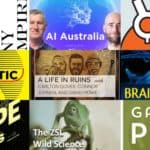The 9 Best Hidden Brain Episodes


Hidden Brain evolved out of Shankar Vedantam’s Slate column of the same name and in the past four years has become a go-to for approachable, smart and unique looks into human behavior and psychology. In Vedantam’s own words, in the show he “reveals the unconscious patterns that drive human behavior, the biases that shape our choices, and the triggers that direct the course of our relationships,” typically in the form of shorter episodes with plenty of guests and sometimes games and quizzes.
The show relies heavily on research, often taking new academic studies or papers as inspiration for episodes, but does not go as in depth as Radiolab or Science Friday. Rather, fans of podcasts like Invisibilia, Planet Money or Freakonomics will enjoy Hidden Brain for its ability to provide real life context to broader, more academic concepts. Episodes often start with a single question that Vedantam and his team of reporters work to answer with scientific, pop culture and historical approaches.

1. The Power and Problem Of Grit
In this episode University of Pennsylvania psychologist Angela Duckworth discusses her research on the concept of grit, which she defines as passion and perseverance for long-term goals. From grades in school to success in sports, business or entertainment, Duckworth essentially presents and measures a new way to understand why some people are successful and others are not that goes beyond the typical idea of perseverance and practice. Her research suggests that to truly be successful and stand out in a field, hard work will only get you so far. The other half of the equation is a deeper drive that comes from purpose, meaning and dedication to the work you are doing.
2. The Edge of Gender
The complicated topic of gender is questioned in this episode from 2017, approaching it from a purely scientific approach. Lise Eliot, a professor of neuroscience at Rosalind Franklin University in Chicago, is the primary guest on this episode and shares insight from her two decades of researching the topic. The episode delves into the debate over gender and the role of nature and nurture, as well as considering the differences between boys’ brains and girls’ brains.
3. Why No One Feels Rich
Keith Payne, a social psychologist at the University of North Carolina at Chapel Hill, wrote The Broken Ladder: How Inequality Affects the Way We Think, Live, and Die and discusses insights from the book and other research about wealth and poverty on this episode. The big takeaway of his research is that we have a bias toward comparing ourselves to people who have more than us, rather than those who have less, thus creating a paradox where even the richest people often don’t feel like they have enough.
4. Lonely Hearts
In addition to his background in science and journalism, Shankar Vedantam is also an accomplished fiction writer and it is in episodes like this one from 2015 where his storytelling abilities shine. This episode of Hidden Brain originally aired on This American Life, in an episode called “The Heart Wants What it Wants,” which gives a bit of insight into how the episode and story are told. The topic is of course love, specifically the act of conning lovers and why we sometimes prefer to believe lies than accept reality when it comes to love. The is science woven into this episode, but it feels more like a longform journalism piece or personal essay.
5. When Did Marriage Become So Hard?
We all know that divorce rates are higher than ever and the concept of marriage has changed dramatically in the past 50 years or so, but what is actually causing the transformation? Are people changing or is there something about the expectations of marriage that is different now? Eli Finkel, a social psychologist at Northwestern University, thinks it is some mix of the two. The episode is about married couples but aspects of it can certainly be applied to any sort of romantic relationship and help explain why dating as a whole seems to be getting so much harder, or at least so much more frustrating.
6. Getting Unstuck
From relationships to professional growth, it is not uncommon to feel “stuck” at times, but there may be more in common with the various ways we feel stuck than expected. In fact, it turns out that the challenges engineers and designers face when designing new products is a very similar feeling and has similar causes to the sense of stuckness that comes from being in a dead-end job without room for growth. How do we learn to accept feeling stuck and more importantly, what can science teach us about getting past it? The episode looks at a series of personal anecdotes and stories to provide examples of feeling stuck and ultimately brings them all together for a series of science-driven ideas that may help.
7. Creating God
This episode features researchers who study religion through the lens of evolution and see religion as a cultural innovation, similar to fire, tools or agriculture. The concept of religion and God as we think of it today has not always existed, and some historians and scientists place the starting point at around 12,000 years ago when human groups began to expand and a greater force was needed to explain new phenomena. One of the key sources in the episode is social psychologist Azim Shariff, who says that the concept of God, specifically as a “great punisher,” emerged and evolved to help us survive as a species and explain the unexplainable in a way.
8. The Ostrich Effect
The ostrich effect is the concept of intentionally tuning out any information that may include painful news or information you don’t want to hear, whether it be distressing current events or TV spoilers. The concept also applies to finance, where the ostrich effect is the idea that some investors intentionally avoid negative financial information. The name is inspired by the common legend that ostriches bury their heads in the sand to avoid danger. In this episode, Vedantam looks into why we do this, and if it is as negative of a human trait as we tend to think.
9. What’s Not On The Test
James Heckman, an economics professor at the University of Chicago and a Nobel laureate, was surprised to learn that people with a GED typically received the same test scores as people with a high school diploma, suggesting that they should have similar levels of success after completing their programs. However, research has found that GED recipients do not in fact stay on par with high school grads, typically not staying employed at the same rates as high school employees and being more likely to be involved in crime. Heckman was curious what the tests used to compare high school graduates and GED recipients were missing, and if there was any way to put a number of someone’s actual potential for career success. Furthermore, Heckman discusses the impact his research has had on public policy and education as a whole.













Comments
Comments are closed.